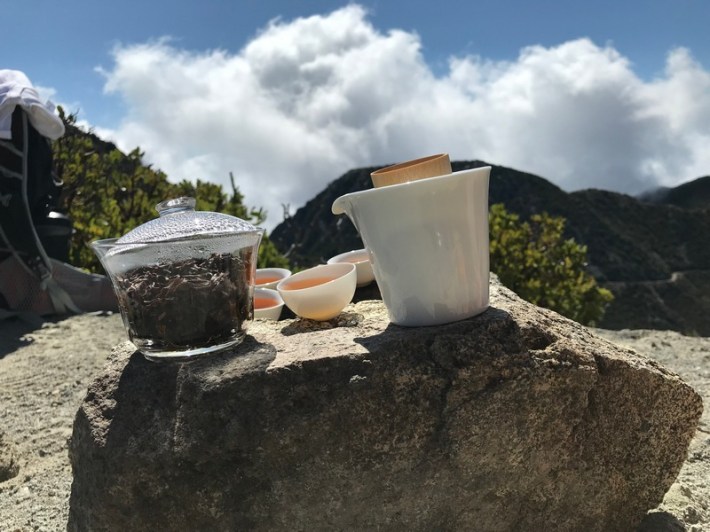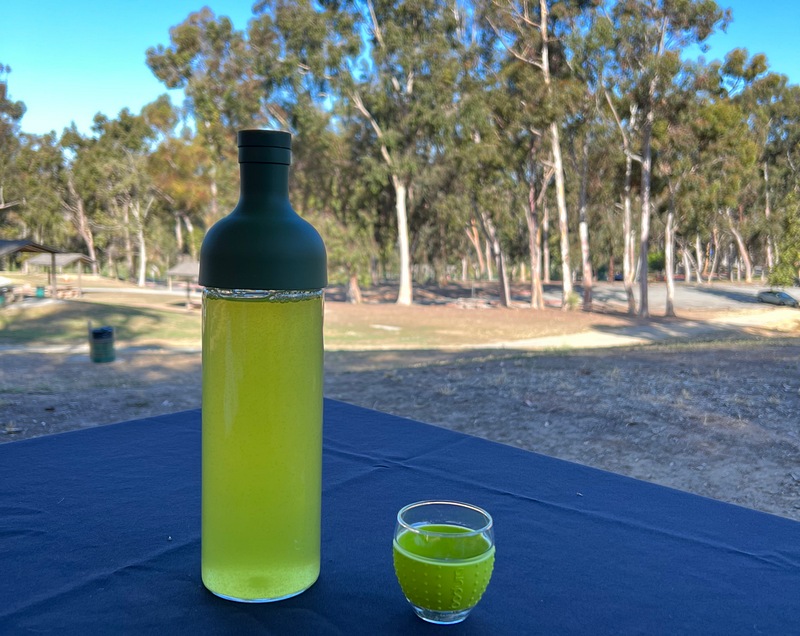I’m aware that a guy who looks like me, with a beard that looks like mine, writing about tea raises a few questions. As the two of us meet for tea tips, on a website born out of taco-worship, I hope you’ll give me a shot because we’re going to be here awhile. If it helps make this less awkward for all of us, I lived in Chongqing, China, for two years, have in-laws in Japan and, in full disclosure, manned the front desk at Tea Master in Little Tokyo most Friday nights from 2017-2019.
I’ve visited tea farms in Yame, Sichuan, Yunnan, West Lake, and Darjeeling. Weighed the experiences at Sakurai, Gen Gen An, Higashiya, and Tokyo Saryo against New York’s Kettl. Compared Seattle’s Floating Leaves to Salt Lake’s Tea Grotto and San Francisco's Red Blossom. Guzzled down Chai at Samovar in the Bay Area and contemplated people’s obsession with Boulder’s Dushanbe Teahouse. In Portland, I found nothing of note after Townsend vanished. I salivate for the Turkish çay I drank in Istanbul whenever I see a backgammon board.
I once drank more than a dozen cups of tea in one Irish-countryside-afternoon simply because I could not decline the offer. I still use my Podstakannik, purchased on the long train ride from Yekaterinburg to Moscow, as well as a tea strainer I managed to locate in desperate months spent in the coffee holy land of Medellín. I also have significant experience shepherding fellow Angelenos safely into the tea world, having spent the final segment of my 100+ episode L.A. fútbol and culture podcast serving my guests the best teas our city offers.
So yes, you can call me a tea* person. Perhaps I love it as much as I do this very city that my family has called home for four generations. The story of tea in Los Angeles is also the story of all the tea experiments that have tried and failed to sterilize, sanitize, and/or corporatize the world’s second most consumed beverage after water. From American Tea Room (Beverly Hills & Downtown LA) to Bird Pick (a Wing Hop Fung concept that had stores in Culver City & Pasadena) to Teavana (the Starbucks attempt to gentrify tea) to Lupicia (Century City), the last decade has seen major investors try and fail to satiate the Angeleno—and by proxy American—urge to give its lesser-loved stimulant another try. Tea is to the American beverage universe what fútbol is to the American sports universe: something the world loves so much that the contrarian American psyche refuses to adore it openly without a fight.
But we are falling in love with it—and like global football, tea is here to stay in Los Angeles. Even as more broad-range stores shutter and some classics get lost (R.I.P. the beloved Korean tearoom Hwa Sun Ji on Wilshire), new specialized ones open.
In a single afternoon, you can sample life-changing oolongs that rival those available in Shanghai, Pu’Erh cakes that cost as much as a used car, and slurp down a bowl of ceremonial matcha so soothing it will make all your problems, including Japan’s multi-year travel restrictions, suddenly disappear.
Grabbing a boba has become as ubiquitous for Angelenos as Brits sitting down to their afternoon cuppa. No city in the U.S.—maybe in the world—offers the range and quality of teas available in Los Angeles and as we take a ride to some of our favorite spots around town, I’ll remind you that the lingering pressure you feel about making a choice between the bean and the leaf is the exact kind of false binary we’re primed to transcend (I’m sure it was just an anxious false equivalency cooked up by a jittery coffee drinker anyway). So, yes, welcome to the Both/And world where coffee and tea live together in harmony.
Here are the places that prove Los Angeles is the city-of-tea-dreams. And yes, there is boba** and kombucha*** too.
*Although I’ve also enjoyed yerba maté lounging on parks in Buenos Aires, rooibos at kitchen tables in Johannesburg, and cold Korean oksusu cha with a cauldron of soondubu on Olympic Boulevard, for the purposes of this guide, I’m focusing on tea from the camellia sinensis plant as opposed to herbal or non-caffeinated teas, which are less commonly but more accurately called tisanes.
** Boba could probably have a whole L.A. Taco guide on its own—and maybe one day it will—but for our purposes here, we’re looking for the best boba Tea drinks in the city, staying away from the fruit juices, tisanes, smoothies, coffees, and other iterations. Boba represents and has been reimagined into many things, and you could do worse than reading an essay on the history of boba in the L.A. Review of Books by author, professor, and scholar Kyla Wazana Tompkins.
*** Like boba, kombucha also could probably have an L.A. Taco guide of its own, but also like boba, kombucha was born from tea. What follows kombucha-wise will focus on the role tea plays in the best kombuchas in the Los Angeles area. For all those who make excellent kombucha at home, my hope is that by using some of the better-quality teas from vendors listed below, your kombucha brews will continue to improve.
Part I: Tea Spots
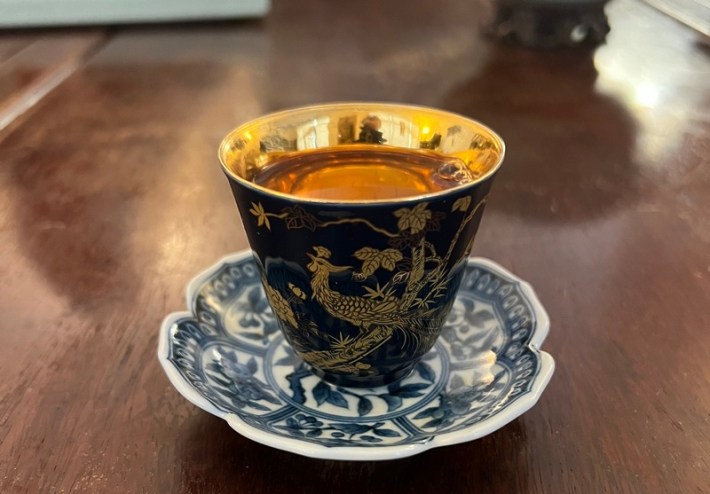
It’s hard to overstate the importance of Imen Shan’s Tea Habitat in the grander American tea universe. An expert in her native Guangdong Province’s Phoenix Oolongs specifically, and rare Chinese teas more widely, Imen is a master curator of loose-leaf teas and tea ware. She’s extremely selective of what she carries, and fights to compete with buyers in China where most of the mainland’s best teas stay, to offer them to tea-heads making online orders, as well as those who request an appointment to visit her small boutique tucked away off Valley Blvd. in Alhambra. The shop is packed to the brim with teas, Yixing clay pots, and gaiwans—the vessel of choice for serving teas in the connoisseur’s preferred gongfu style (in short: more leaf, smaller cups, less steep time, more infusions). She’s also a delight to sit and drink with, where the minutes turn to hours like they might at a good bar with a close friend. Imen is someone who knows her shit but has no pretensions about it.
Apart from the dozen varieties of Phoenix Oolong (it’s a sub-category with astounding range) on offer that require a little more skill to brew properly, her Chinese black teas from Fujian and Yunnan are perennial classics that cannot be brewed wrong. Her yearly stocks of fresh spring Green teas from Sichuan (Zhu Ye Qing) and Zhejiang (Long Jing) are exquisite if you can get them fresh, throw in enough leaf to cover the bottom of your favorite glass or mug, and drink in the casual way many Chinese call Da Bei Cha (that some English-speaking tea people call “Grandpa Style” online) but that Imen prefers to refer to as “Mugging.” Pro tip: scoot over for dim sum at Lunasia before or after your tea tasting with Imen. If you aren’t ready to sit and drink teas in-person with Imen, her teas are available online and word is that some will be available at the soon-to-be-opening Canyon Coffee brick-and-mortar in Echo Park.
Recommendations:
- Tea Tasting w/ Imen (RSVP required)
- Single Tree Phoenix Oolong (Through The Heaven, Duck Shit, Eastern Red)
- Green Tea (spring Long Jing)
- Black Tea (unsmoked Lapsong Souchang)
- Teaware (Gaiwans, cups)
28 S 5th St. Unit E, Alhambra, CA 91801. Closest Metro lines and stop: Bus Line 78 - “Main/3rd (eastbound)” or "Main/5th (westbound)" or Bus Line 260 - "Atlantic/Main."
IG: @teahabitat
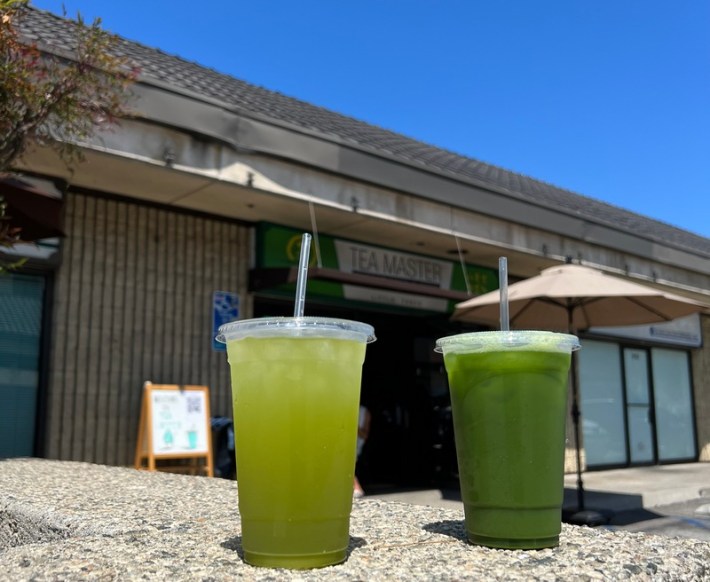
It’s been more than a decade since matcha came to the Los Angeles café mainstream but matcha is not new, not even in Southern California. According to scholar Robert Hellyer’s 2021 book Green with Milk & Sugar, people were enjoying matcha at an exhibition in San Diego as far back as 1935. These days, whether sprinkled on pastries, offered as an add-on right below wheatgrass on drink menus, or simply touted as a vague health elixir that will cure all that ails you (or simply make for a great Instagram photo), matcha powder has a become a kind of magical sawdust of an ingredient, rather than simply just a tea, in its own right.
Some of these places around town can’t resist the temptation to tack on the word ‘ceremonial’ to their matcha products, even if it’s actually green tea powder rather than the labor-intensive matcha being offer. Out of this emerald swamp, Tea Master in Little Tokyo’s blue kawara clay-tiled Honda Plaza stands as a place apart.
Both students of the revered Edosenke Tea School, Tea Masters’ Daigoro San and his wife, Kanako San, are the real deal. These Japan (Tokyo and Yokohama, respectively) natives treat each of their products—from lattes to soft serve to artisan crafted bowls of usucha matcha—with sincerity and love for their country’s contributions to tea culture. Apart from their popular café items, Tea Master has an incredible selection of loose-leaf and bagged green teas from Japan (sencha, gyokuro, hojicha, and genmaicha) and teaware (side handled kyusu pots and cups; matcha chawan bowls, bamboo chasen whisks, and chashaku scoops).
Like Imen at Tea Habitat, Tea Master always has a fresh stock of new green teas (shincha) in spring and early summer that will astonish even those who are new to tea. Like Sushi Gen across the parking lot in Honda Plaza, it would be hard to find better traditional options outside of Japan. Visit Tea Master before or after you have the best sushi in Los Angeles and continue to stay stocked at home by ordering teas online.
Recommendations:
- Café visit (soft serve, hot latte, unsweetened cold matcha green tea, ceremonial matcha)
- Matcha (Yame No Hana for daily, Seiju for special occasions)
- Sencha (Maro, Koshun, Cold Brew tea bags)
- Any Gyokuro or Shincha
450 E 2nd St, Los Angeles, CA 90012. Closest Metro lines and stop: Metro A or E Lines - "Little Tokyo/Arts District Station" or Bus Lines 30 or 106 - “1st/Central.”
IG: @teamaster.la
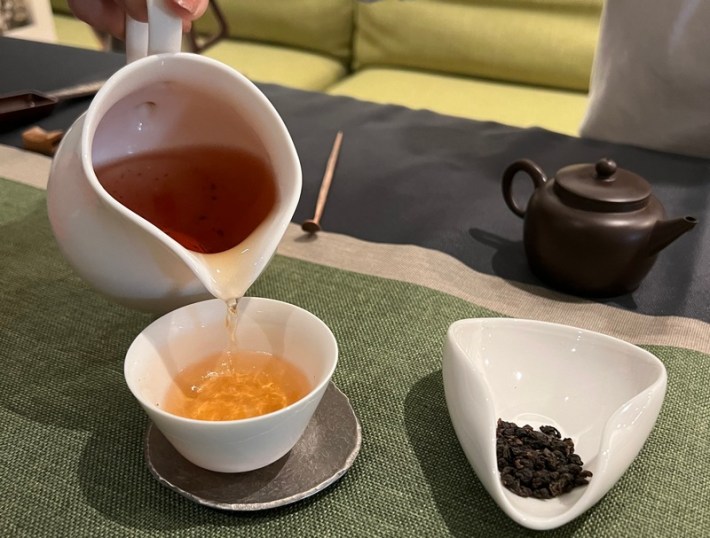
Like Denong (see-below), Yoshan is an overseas tea producer who chose to open its flagship U.S. store in the Los Angeles area. Since 2016, Yoshan has been selling Taiwanese oolongs out of Arcadia with a medium-sized, showroom-style “Tea House” where you can sit and sample their teas. While Yoshan offers a lot of the more modern lightly roasted oolongs and high-mountain teas from Lishan and Alishan—often made with the famously milky-fragrant cultivar Jin Xuan—its specialty is Dong Ding oolong. You’ll see Dong Ding translated into English as many things from “snow peak” to “frozen summit,” but the reality is that, like Alishan, Shan Lin Xi, and Lishan, it simply refers to a specific tea growing region in Taiwan.
Where Taiwan is increasingly famous for those high-mountain/light roast oolongs, Ding Dong represents its traditional, heavier roasting past. Yoshan traces its tea growing roots back to 1880, when what we now know as Dong Ding was a local tea drawing on farming, processing, and even the tea cultivars used in mainland China’s Fujian province, where traditionally, darker-roasted oolongs like Da Hong Bao (Big Red Robe) and Tieguanyin (Iron Goddess of Mercy) come from. It’s a worthwhile experience to trek out to Arcadia to try the fresh, mild, and roasted Dong Ding oolongs in-person, where you can get the full Taiwanese-style tasting experience, which often uses adds a Xiang Bei (fragrance cup), helping to accentuate how different the teas taste from each other and with each steeping. There are other Taiwanese staples too—oolongs like Eastern Beauty and Four Seasons, and black teas from Sun Moon Lake—but the Dong Dings will give you the best sense of Yoshan’s quality and, in a sense, a bridge that connects the history of oolong tea itself. Plus, you’ll get to sample the real-deal versions of the oolong teas so many boba shops are using in their drinks across town.
Recommendations:
- Oolong tea tasting
- Dong Ding
- Taiwanese High Mountain Oolongs
30 E. Duarte Rd. Arcadia, CA 91006. Closest Metro line and stop: Bus Line 287 - “Santa Anita/Duarte.”
IG: @yoshan_tea
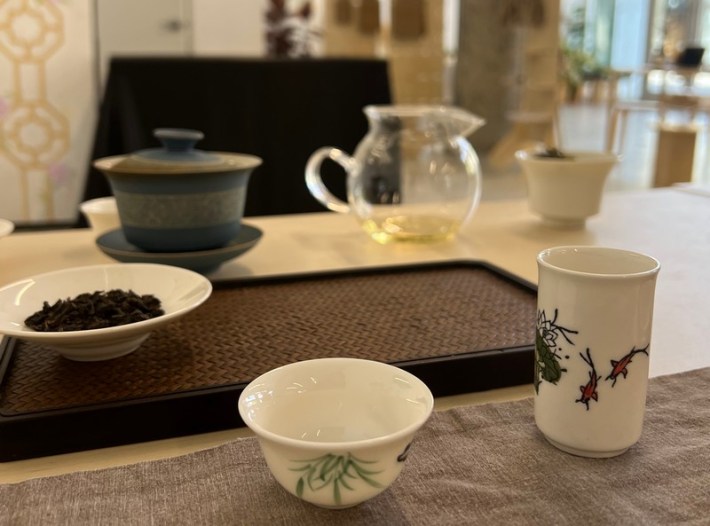
Unless you are born into a tea producing family, everyone has a story to relate how they got deeper into the leaf game. Often, these stories revolve around a thread of curiosity that gets pulled and pulled until the whole fabric of one’s life gets rearranged. This is certainly the case for Kioh Park, who left his native South Korea to study in Shanghai when he was young. Barely a teenager and not yet fluent in Chinese, he started dipping his head into small tea shops looking for something special. He wanted a tea that he and his family back in Korea could love. Sampling the offerings at one shop, he discovered Tieguanyin, the traditional oolong from Fujian province that’s called “Iron Goddess of Mercy” in English.
In some ways, Tieguanyin sits at the center of the tea universe. It’s a balled oolong that can be anywhere from lightly to heavily roasted, and was a precursor to the oolongs that Taiwan would eventually start producing (and that the people would fall in love with the world over in both boba teas and more ceremonial settings).
In Tieguanyin, Kioh and his family found something distinct, something that spoke to them. It turned out that the shop he stumbled into was from a 13th generation tea-producing family. Over the next 10 years living in Shanghai, Kioh kept following this initial thread of inspiration into the wider world of traditional Chinese teas. Eventually, he opened a small tea shop in Korea in 2015 before moving to Los Angeles a few years later. Here, Kioh offers tea classes, plays an active role in the Korean craft pop-up Maum (which celebrates Korean makers and Korean excellence), showcases Korean teas as well as tisanes (fermented green tea, mugwort tea, lotus leaf tea), and dreams up ways to bring excellent teas into the L.A. culinary world through tasting menus and events. His classes aren’t cheap—between $80 and $200 for a couple of hours—but what’s special about drinking teas with Kioh is that his way of preparing and serving teas is uniquely his own. For a recent class, he served three outstanding kinds of Tieguanyin using a Korean-made gaiwan, a copper kettle, and a Chinese tasting set from the 1980s. He’s managed to take that initial spark of tea-love as a teenager alone in Shanghai and spin it into a tea experience that’s all his own. If you love tea and live in Los Angeles, even if his classes are out of your budget range, try some of the teas he sources (they can be ordered online or at his events) and keep an eye on Kioh—the story of his romance with tea is far from over.
Recommendations:
- Tea class (Tieguanyin oolong aka “Iron Goddess of Mercy”)
- Fermented green tea from Korea
IG: @KiohTea
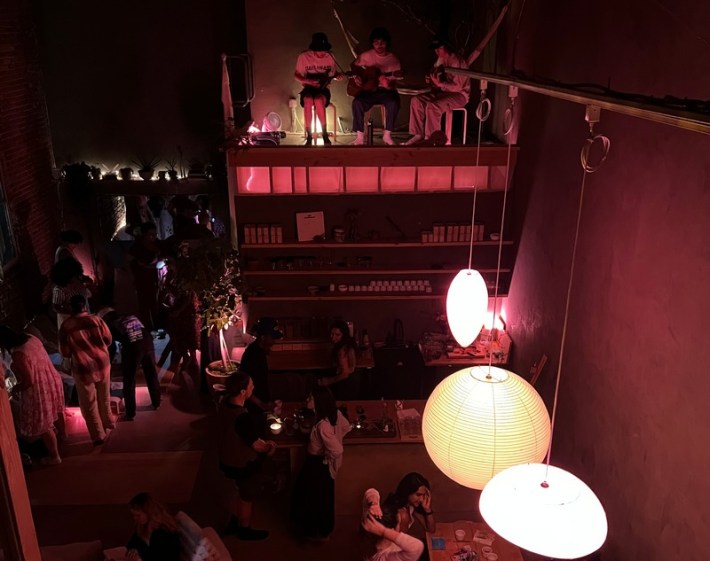
In the West, tea is often reduced into a solemn activity, where a person drinks tea alone in silence, ostensibly staring out a window, lost in thought. While there is a dimension of tea drinking that includes that, for centuries it has also served as just as much of a social drink as wine, beer, or coffee. The tea houses that proliferate around the globe might offer their own cultural distinctions and styles, but each serves first and foremost as a community gathering place. If third-wave tea is starting to reshape these tea houses across the world, Tea at Shiloh offers one glimpse at some of the best of what’s to come.
On the one hand, it’s a Downtown Los Angeles warehouse party for people who’ve grown tired of warehouse parties. It re-imagines the ‘idea of what nightlife can be by designing environments that lightly touch upon all the senses.’ On the other hand, it honors the traditional function of a tea house as a place to gather and spend some time in thought, creative expression, or conversation. Softly lit, carefully designed, and comfortably furnished, it’s a shoeless third place where the soundtrack shuffles between live ambient music from the likes of local artists like Lionmilk and a playlist flush with both Dorothy Ashby and D’Angelo. The vibe is as much future as it is past, part pgLang, part self-care. It’s the most comfortable place to get out of your comfort zone.
The tea itself is all-you-can-drink and consists of four hot and four cold teas (approximately half are herbal/tisane infusions). Among the hot options during Summer 2022 are a Chinese white tea from Yunnan and a Second-flush Darjeeling from the all-women owned Jungpana garden. A favorite among the cold teas was a hearty gunpowder green tea mixed with mint that was popularized in Northern Africa and is often called Moroccan Mint Tea.
The truth is that it’s hard to brew great tasting teas in large batches, but they are finding options that strike the right balance between convenience and quality. There is no menu or ordering system. You are given a tour of the space by Shiloh or one of the other hosts, handed a cup, and allowed as much tea as you’d like during a four-hour window on most Thursday, Friday, Saturday, and Sunday nights. These are collectively called the ‘connect’ nights and are evenings for tea and conversations. Mondays, Tuesdays and Wednesdays are ‘create’ nights and feature ‘intimate workshops that engage the senses.’ The workshops rotate weekly and include everything from flower arranging to nude figure drawing to immersive cosmic soundscape sessions.
Prices for the workshops vary from $40 to $95. Reserving a space for late night tea costs $35 and often sells out. It’s a sincere and relaxing way to spend a weekend night, the kind of place where you can whisper and be heard. Tea at Shiloh adds a tea-colored hue to the kaleidoscopic nightlife options available in Los Angeles and is as enjoyable to spend time alone in as it is with friends or a partner.
Recommendations:
- Late night tea (Thurs-Sunday)
- Come alone for optimum exploration
Undisclosed DTLA location (you are sent the address when you reserve a spot)
IG: @tea__at__shiloh
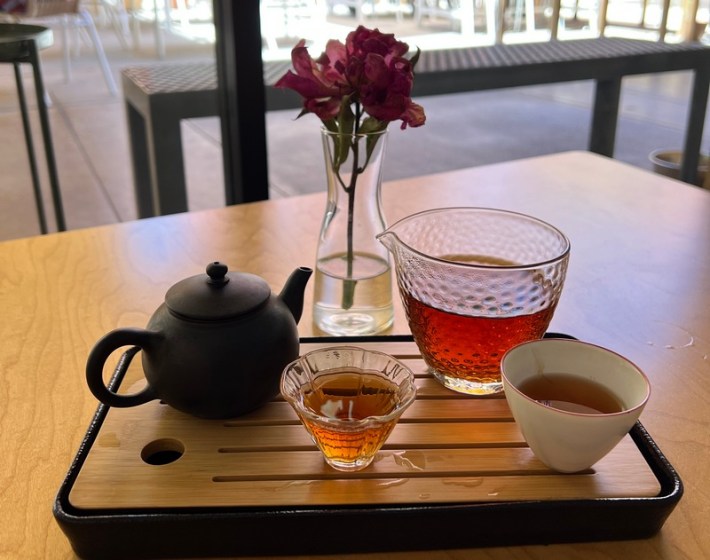
Nestled off Broadway in the far north end of Chinatown’s Mandarin Plaza, Steep LA is a newer and more modern take on traditional tea culture. Opened in 2019 by younger owners Samuel Wang and Lydia Lin, this is a place where seasoned tea lovers and newbies can hang in peace. There are cold brewed, to-go green, oolong, and pu’erh bottles for days when you can’t swing a gongfu session, and DIY or assisted options when you can, where variable control kettles are waiting for however many infusion re-ups you can handle.
With two options—and some seasonal specials—per major tea category (green, oolong, black, pu’erh) this is a place built to experiment and explore teas with a friend or solo dolo. Grabbing a lunch of Hainan-esque chicken rice, curry rice, daily pastries, or ochazuke (a kind of Japanese rice porridge with pickles and tea) before or after your session is a good move, especially if you want to try both a cold brew tea (with the meal) and a gongfu session to ensure you will get properly tea lit. There are ample, and reasonably priced, teawares available in the showroom to keep the party going when you get home and you can buy any of their loose leaf teas to brew later as well.
You can find higher quality teas from other vendors in Los Angeles but this is a good first stop for folks who may be new to tea. They even have high-quality bags if you’re not ready to go full tea head just yet, or you simply want a convenient option. The best way to spend a few hours here is to eat inside, then head to the outdoor seating area for a gongfu session. You can close your eyes and imagine you’re in a park in Chengdu or Taipei doing the same thing, letting an afternoon burn away in a lucid, L-theanine buzz. Recently, Steep LA began offering tea-infused cocktails at night from Thursdays-Saturdays, along with their cold brews and hot teas.
Recommendations:
- Lunch (Chicken Rice 2.0, cold brew Pu’erh, and the daily pastry is a winning combo)
- Steeped / Gongfu Tea (Maojian for green tea, Lishan for Oolong, seasonal teas)
970 N. Broadway Ste. 112 Los Angeles, CA 90012. Closest Metro lines and stop: Metro A Line - "Chinatown Station" or Bus Line 45 - “Broadway/Bernard.”
IG: @steep_la
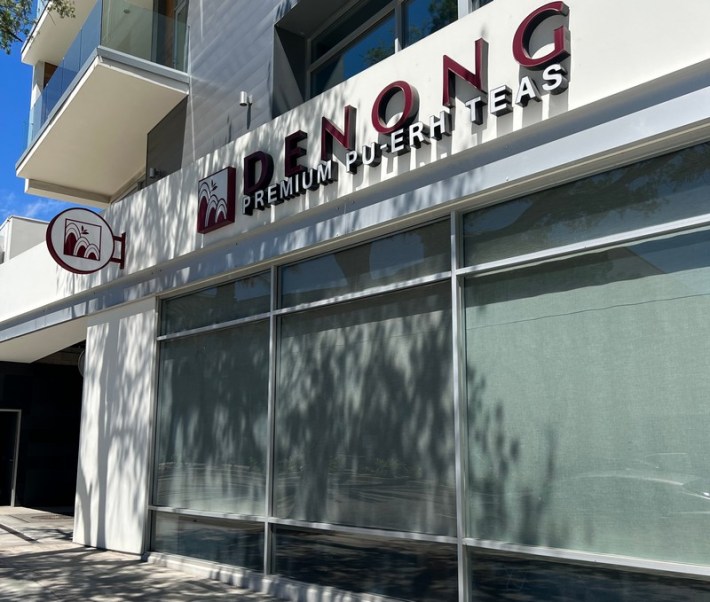
Opened in November 2017 (the same month and year as Tea Master), Denong has been the premier local hub for Pu’erh teas, not just in Los Angeles, but on the entire West Coast. You might be able to spot the unmistakable disc-shaped cakes, wrapped individually in thin paper or stacked together in a bamboo husk and sold as a bundle, in other tea shops in-person or online. But few, if any, other actual producers of Pu’erh tea have brick-and-mortar locations outside of East Asia (Denong’s other stores are in Yunnan, the home of Pu’erh production, as well as Hong Kong and Taiwan).
Pu’erh is the most commonly fermented tea, and like most things fermented, it has its enthusiasts (and even its own subreddit) as well as its haters (“I only taste dirt”). Since it has the better-with-time qualities of good wine, it can also command prices so high ($1000/gram in the late ‘00s) that people sometimes use cakes as investment vehicles. Most pu’erh teas are produced one of two ways: the modern style (熟 shou, or cooked/ripe Pu’erh) and the traditional style (生 sheng, or young/raw Pu’erh).
You don’t need to know any of this to cruise over to Pasadena and walk into Denong’s spacious tea room, where you can sample teas—Jeffery is particularly good at explaining some of the nuances for newbies and experienced drinkers alike. There are those who cite Denong’s rather high prices—especially for their Famous Mountain teas and yearly collections that run well over the $1/gram many people consider “fair” for quality Chinese teas—but the quality is usually apparent even in their more reasonable “Essentials” collections, which also include excellent black and white teas from Yunnan.
COVID has meant their Pasadena store and tastings have been open/closed at different times, so be sure to contact them in advance of a visit, but if you are curious about pu’erh, there are probably very few places outside of East Asia where you can explore the breadth of what you can here. And you don’t need to feel bad about it. The higher price tag for tastings or products is still a fraction of what you’d pay at a high-end liquor or wine producer—and all of their goods are available online.
Recommendations:
- Pu’erh tasting (sit for a little and try both sheng/shou styles of Pu’erh and get schooled on what many consider to be the most complex/expensive styles of tea) when/if they are open.
- At-home daily drinkers (2018 Black Essence Shou Pu’erh, 2019 Black Tea, 2017 White Tea)
- Annual/Mountain-specific Pu’erh cakes
482 S. Arroyo Pkwy #108, Pasadena, CA 91105. Closest Metro lines and stop: Metro A Line - "Fillmore Station" or Bus Line 260 - “Fair Oaks/California.”
IG: @denongtea
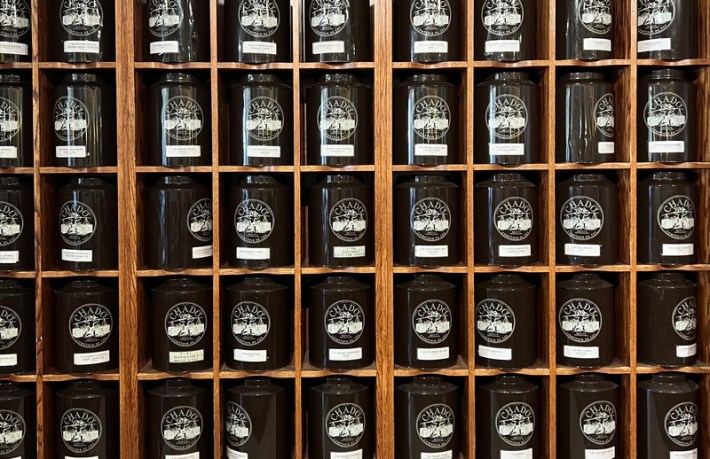
While Los Angeles boasts some of the best options in the United States for quality loose-leaf Chinese, Japanese, and Taiwanese teas, one of the city’s older tea shops caters to those tea-heads looking to get their fix of Indian, Sri Lankan, or Kenyan teas. For over 30 years, Chado—which has locations in Pasadena, Little Tokyo, Hollywood, and Torrance—has offered spaces for the kind of “afternoon tea” experience that involves half-sandwiches, scones, and butter cookies. If blended teas are your thing, Chado also has those in abundance (more than a half dozen different kinds of Earl Grey, for example). Since they carry teas from all over the world****, you might be tempted to see it as a one-stop shop for all things tea, but this is not the case.
The rule of thumb when buying tea is that a buyer should know, at the very least, the year (if not the month or specific date) of its harvest and the location (sometimes down to the garden or farmer), where a given tea came from. While some of Chado’s teas lack this, they do offer these kinds of specifics for their Darjeeling, Assam, and Ceylon teas specifically. This all stems from Chado’s roots. Founder Devan Shah was born in Mumbai and even opened Chado outposts in India’s largest city before his passing in 2016. Devan’s wife, Reena, has helped promote tea culture and education in Los Angeles through Chado and the city’s tea festivals for decades. Chado usually has several flushes of Darjeeling and Assam teas from different gardens and grades in stock. They also offer numerous kinds of house-blended chai. Not surprisingly, these are the best teas to enjoy here whether as a stop in for tea-time or to brew at home.
Chado may be the best place in town to sit for a British-style cuppa while grappling with the uncomfortable colonial history of tea. If you are looking to try something outside the box, Chado also carries several teas from Bitaco, a producer of Indian-style black teas and blends from the mountains outside of Cali, Colombia.
Recommendations:
- Darjeeling and Assam Teas
- Chai
- Afternoon Tea Service
79 North Raymond Avenue, Pasadena, CA 91103. Closest Metro lines and stop: Metro A Line - "Memorial Park Station", Bus Lines 177, 256 or 501 - “Raymond/Holly" or Bus Lines 180, 662 or 686 - "Colorado/Raymond."
369 East 1st Street (Inside Japanese American National Museum), Los Angeles, CA 90012. Closest Metro lines and stop: Metro A or E Lines - "Little Tokyo/Arts District Station" or Bus Lines 30 or 106 - “1st/Central.”
6801 Hollywood Boulevard, Suite #209, Hollywood, CA 90028. Closest Metro lines and stop: Metro B Line - "Hollywood/Highland Station" or Bus Lines 212 or 217 - “Hollywood/Highland.”
1303 El Prado Avenue, Torrance, CA 90501. Closest transit lines and stop: Torrance Transit Lines 1, 4X, and 5 - “Torrance/Cabrillo.”
IG: @chadotearoom
****So far, no shop that I’ve seen sell tea from “all over the world” sells great teas from all over the world. It’s very difficult to source excellent tea from places with such different styles of growing, producing, and consuming teas. For buyers, it’s better to stick to specialists, as this guide tilts towards.
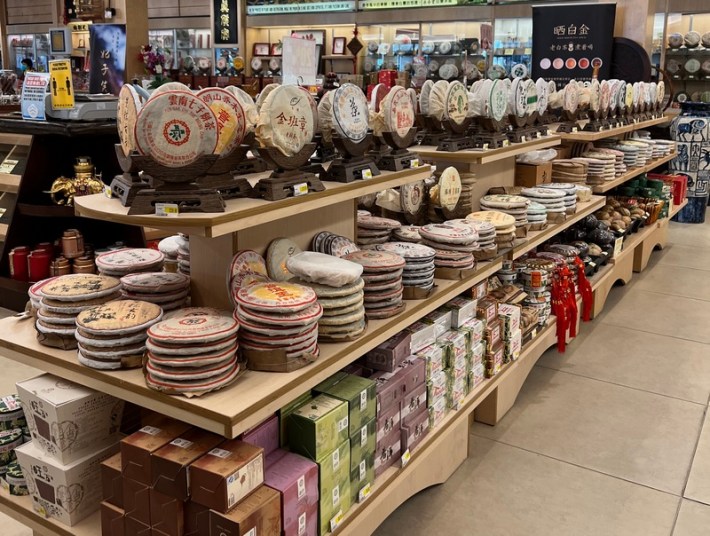
Among the oldest and longest-running shops selling loose-leaf tea in Los Angeles (since opening in Chinatown in 1985), Wing Hop Fung is a Southern California institution. Offering expertise on TCM (Traditional Chinese Medicine) herbs, the first-time visitor to the large Santa Anita location is met with a collection of teas and tisanes vast enough to overwhelm the mind and the senses. There is a long display where pu‘erh cakes are presented like dinner plates. There are chests with porcelain and clay tea sets stacked like luggage beneath displays of giant, ornamental Yixing teapot reproductions. There are dozens of loose-leaf tea bins arranged by category and grade. An organic silver needle white tea from Fujian Province in China is priced on the high end at $700 a pound, with the lowest of four grades of Chinese longjing green tea listed at $40 per pound. There are enough kinds of teaware alone—from serving tables to gaiwans to scoops to cups—to spend an afternoon exploring.
With the proliferation of online vendors (and frankly, the higher quality and lower prices many of them offer) this sort of tactile purchasing experience feels like it’s on the way to extinction. While Chinese grocery stores like 99 Ranch Market and an increasing number of other markets offer teas and tea supplies, the scale and variety is unmatched at Wing Hop Fung, which shares a lot in common with similar markets in mainland China, Hong Kong, and Taiwan. It is not a bad first stop when you are just starting to learn about the world of tea, with prices that are usually much more affordable. You can absolutely find better quality teas and teaware elsewhere in Los Angeles, but nowhere else offers the Chinese tea culture playground that Wing Hop Fung provides. Let’s hope it lasts forever.
Recommendations:
- Tea exploration
- Affordable tea ware
The Shops at Santa Anita Store, 400 S. Baldwin Ave #2185 Arcadia, CA 91007. Closest Metro lines and stop: Bus Lines 179 or 268 - “The Shops at Santa Anita.”
Monterey Park Store, 725 W. Garvey Ave Monterey Park, CA 91754. Closest Metro lines and stop: Bus Lines 70, 106, or 260 - “Garvey/Atlantic.”
IG: @winghopfung
Part II: Tea in Coffee Spots
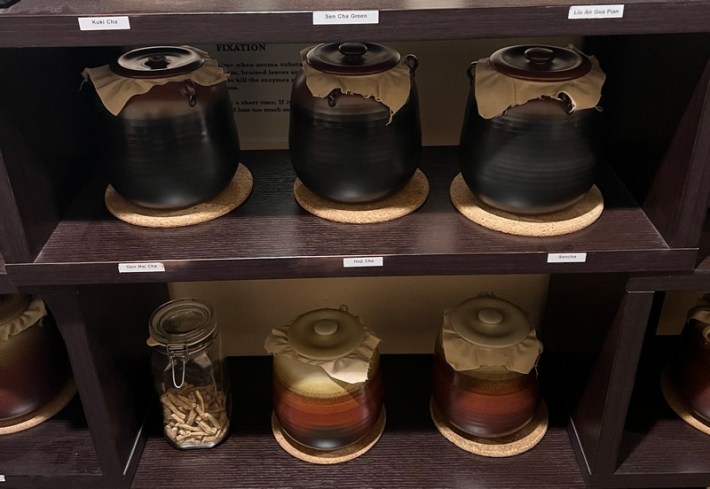
Striking that elusive sweet spot of a place that offers both good tea and good coffee, Funnel Mill feels like a rip in the caffeinated beverage universe. Devoid of the design and marketing aesthetics (and irony) that often accompanies third Wave Coffee spots, owners J.C. and Teresa have carved out an unpretentious space on an unassuming Santa Monica retail corner for coexistence to thrive.
Since gaining early notoriety as the only vendor of Kopi Luwak (an Indonesian specialty made from civet-defecated coffee beans) in L.A., Funnel Mill has shown a knack for doing things a bit differently. They stone grind their matcha to order. They cold-drip siphon-certain coffees. There are a few sentences, if not full paragraphs—and in some cases a full page— of information about most of the coffees and teas on their menu. They take things seriously and their higher prices (by comparison to your run of the mill coffee/tea joints, at least) reflect this.
Importantly, those prices also go into the quality of not just the products but how they’re served. The Masala Chai is made over a stove top, strained into a stainless-steel serving pot and served to you in a tall glass with a side of Tahitian select vanilla sugar to add to your liking. The Anxi Tikuanyin (Tieguanyin/Iron Goddess of Mercy) is offered alongside a sizeable stone kettle with temperature-appropriate water and an easy-to use (and hold) small ceramic teapot, with a matching pitcher that a dried hulu gourd fine strainer fits snugly on top of for optimal brewing. The set up for Japanese loose-leaf genmaicha is all glass, including the glass pot with a tightly coiled metal strainer that prevents any of the tiny bits of leaf from winding up in your cup and compromising your brew. These details might seem over-the-top, but many in the tea world believe that if you don’t serve your tea with the care it deserves, you are essentially disrespecting the farmer who labored to grow it and the natural world where it was grown. Most importantly, not using a one-size-fits-all approach to serving tea is the difference between a delicious tea and what Lu Yu, the oldest tea scribe, described as the ‘swill of gutters’ way back in the 8th century.
Funnel Mill’s approach is a welcome contrast to the too-common experience of ordering tea at a coffee place and being handed a paper cup, with a sad little string hanging over the side, and having to endure a murky brew that, at best, tastes like flavored water.
Pro tip: bring your laptop and work at Funnel Mill for a few hours, enjoying the multiple steeps the staff encourages of whatever tea you choose. Word is that the sky-high rent in Santa Monica means this operation may move fully digital in the next couple months, so get in there and enjoy while you can or find them online.
Recommendations:
- Pot of tea (any Chinese or Taiwanese)
- Bring a coffee-only friend
930 Broadway, Ste A, Santa Monica, CA 90401.
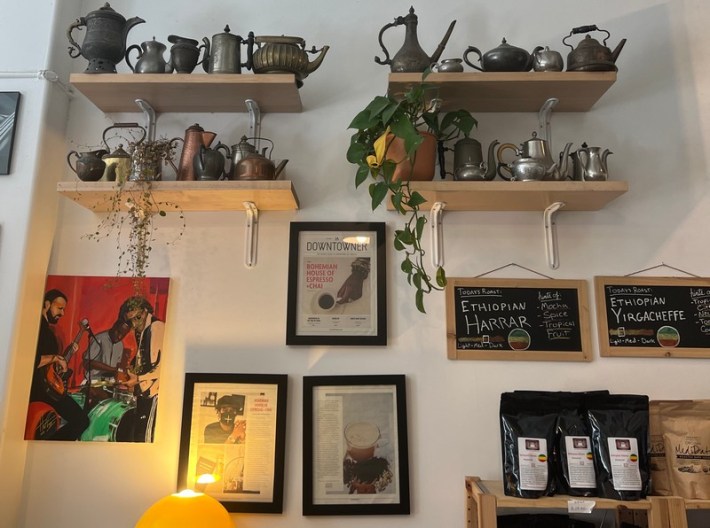
Bohemian House of Espresso + Chai
Near the corner of Spring and 6th Streets in the heart of Downtown, Farah A. Hagar has created arguably the best place for chai and coffee lovers to unite in the city. Lined with black and white photos of revolutionaries, ample seating—including a capsule pod chair that’s cracked-open like an egg—and a shelf lined with antique chai-style tea pots, Bohemian House lives up to its name in more than just décor.
Raised in Somalia and Kenya, Hagar is also an author, and his 2016 paperback “Blackie Bohemian: Book of Questions” is always near at hand. In it he posits scenarios in bold-type built for his clientele.
The slim book’s back cover explains more: “After operating espresso bars, I noticed that people stopped communicating with each other. They started being more involved in their phones and laptops, rather than talking with each other. From this, I determined that people needed a way to start the conversation.”
Through these simple questions—“If you could live a year in the life of any other individual on Earth, who would you choose?,” and “why can humans create and other beings cannot?”—Hagar lures guests into a certain frame of mind where his more stripped-down chai flavors of cardamom, cinnamon, and ginger urge the tea drinking experience into something a bit more in line with the bohemian culture of coffee. In fact, you can commit the ultimate act of caffeinated revolution by blending the leaf and bean together: Farah makes a stellar dirty chai. Here, in one of the densest and most hectic strips in Los Angeles, you can find peace where the spirit of the coffee and tea house combine into something that feels like it could save the world.
Recommendations:
- Sip your chai (or dirty chai) in the meditation pod while reading Blackie Bohemian
548 S Spring St. R110, Los Angeles, CA 90013. Closest Metro lines and stop: Metro B or D Lines - "Pershing Square Station" or Bus Lines 16, 18, 28, 30, 33, 53, 60 or 92 - “Spring/6th.”
IG: @bohemianchai
Part III: Boba Tea
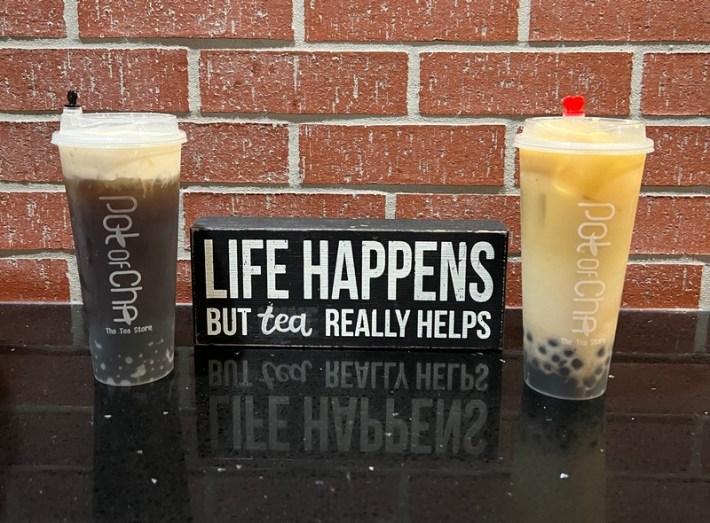
Who among us hasn’t done rudimentary research into the economics of a boba shop, hoping to find cartoonish profit margins and a few good reasons to make a bad business decision?
I’m not an economist but what I can imagine is that the easiest way to make things actually profitable, rather than delicious, is to simply skimp on the tea. In other words: buy lower quality teas in bigger bulk that sit around for longer periods before being used. This is the path that most boba places take. You can taste it (especially if you tend to order your drinks with less or no sweeteners) and it seems to be much more common at boba chains, ostensibly because they are buying their teas in even larger bulk amounts.
When a boba shop doesn’t use this approach—as is the case with Pot of Cha, an unassuming gem nestled into a USC-adjacent strip mall on Figueroa—it makes all the difference. Their Taiwan-sourced teas (Red Ruby Black Tea, Full Roast/Tieguanyin Oolong, Golden Phoenix High Mountain) taste like real quality teas, even without sweetener, and whether you order them with or without milk, fresh milk, or my preferred, salty cheese.
Their regular tapioca pearls aren’t out of this world, but their mini pearls are particularly good with any of the above teas. The prices here are fair, the wait is never outrageous (since none of their drinks has gone viral on Instagram, thank the tea gods) and the interior is stripped down with a brick wall one on one side, several informational panels about their main teas, and a few small clay yixing teapots on shelf behind the register. Since the pandemic, they haven’t offered indoor seating, but take your boba tea from Pot of Cha to go and ride around knowing that you might be sipping the best driving drink in Los Angeles proper.
Recommendations:
- Full Roast “Tieguanyin” Oolong, 25% sweet, mini-peals, salty cheese topping
3013 S Figueroa St, Los Angeles, CA 90007. Closest Metro lines and stop: Metro E Line - "Jefferson/USC Station" or Bus Line 81 - “Figueroa/30th.”
IG: @potofcha
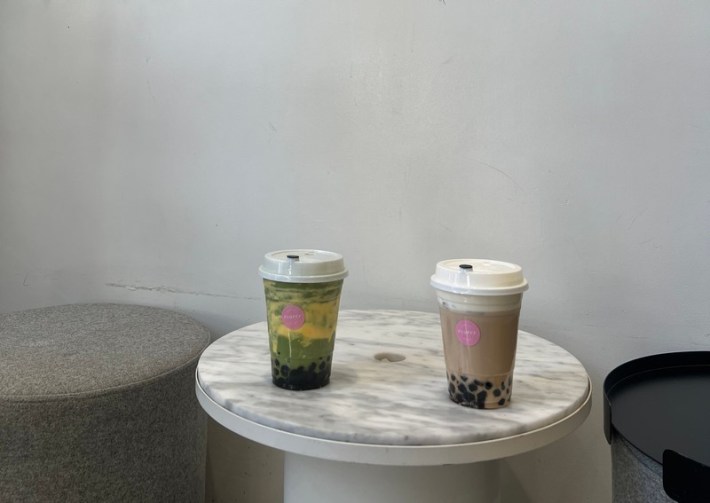
When the cheese-tea phenomenon landed stateside a few years ago and people started freaking out about it—for better and worse—Jenny Zheng was already ahead of the curve. She launched Little Fluffy Head Café in Downtown LA in August 2017 and soon found herself breaking down why Americans were trepidatious about drinking cheese to Eater.
The kind of cheese at Little Fluffy Head—and found at many boba shops around town now—is, of course, different from pizza cheese. It lands between whipped cream and a whipped cream cheese, but Little Fluffy Head calls theirs “Cheesecake Cream.” On its own, it tastes like slurping down tiny salty clouds.
Offering a third dimension to the tea and the boba in the drink, a cheese topping adds a salted caramel or chocolate taste, with the savory working in tandem with the sweet to produce a new flavor from the first to the last sip. Where some prefer lychee jelly, aloe, red bean, taro, or the dozens of other boba add-ons, none offers the kind of slicing contrast as a good cheese topping.
The tea world is full of these kinds of contrasts. At many of Tokyo’s finest tea purveyors, you sip your bitter, astringent, or umami sencha or matcha with a traditional wagashi sweet. In the parks of Western China, you munch on crispy sunflower seeds—between sips from a gaiwan full of flowery oolong or grassy green tea.
At Little Fluffy Head you can also lean into the cheese add-ons with drinks like the Chedd-cha, which takes a matcha latte and adds a cheese topping and chunks of white cheddar into the mix. The Original with black tea, the roasted oolong, and the traditional, flavored teas (like osmanthus and jasmine) all work well with Little Fluffy Head’s cheese toppings— they also offer a vegan coconut cream option.
The spout of the cup is designed so you get a little cheese and a little tea in every sip on one side and slurp up the boba balls through a straw on the other side. It’s nice to enjoy the drinks in the store, sitting on the stool, flipping through a magazine as you flip the cup back and forth, thinking about how tea and cheese are practically made for each other when boba gets involved.
Recommendations:
- Fluffy Tea (tea with cheese): Roasted Oolong, Milk Tea: Original, Matcha: Camouflage
- Toppings: Boba, Soybean Dust, Barley Flakes
203 W. 7th St. Los Angeles, CA 90014. Closest Metro lines and stop: Metro B or D Lines - "Pershing Square Station" or Bus Lines 40, 45, 55, or 92 - "Spring/7th."
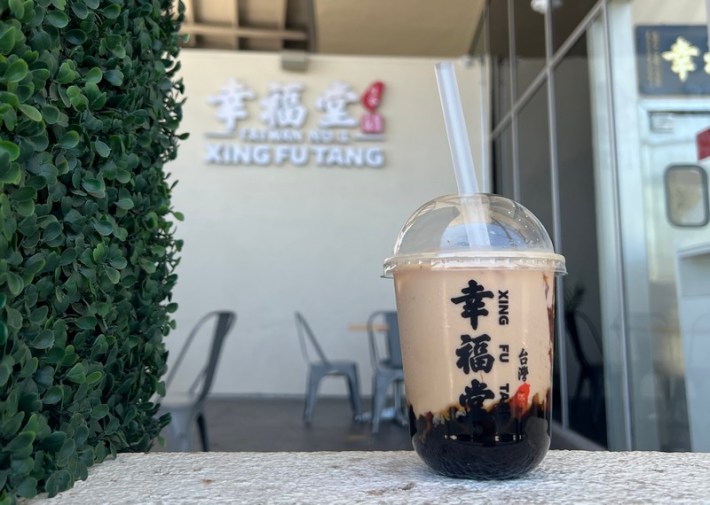
In the spring of 2021, when the boba shortage hit, people lost their marbles over the absence of the little tapioca delights in their drinks. By the time the global supply chain issues were resolved, tea heads had grown to appreciate the boba balls themselves a bit more. It became more obvious which ones were made better than others.
It may be a massive company—complete with its own corporate and franchisee squabbles—but when it comes to boba manufacturing, few can match Xing Fu Tang’s process. Their brown sugar boba is flattened, folded, sliced, tossed, and caramelized right there in front of you. By the time the warm gooey lumps travel up your straw, mixing with the icy milkiness of your chosen tea, you understand that not all boba is the same.
With locations around the world, including New York and Houston, as well as Alhambra and Rowland Heights, Xing Fu Tang is a global force. This makes for other less-than-ideal aspects to their factory-like shops. You can’t change the sweetness level (although that’s rumored to be changing soon), the amount of teas are limited, and they charge more for their drinks—including throwing gold foil on top of their signature milk tea for an ostentatious up-charge that adds no value to the taste of the drink.
If you go straight down the middle though, and order either the Boba Milk Tea or Oolong Milk Tea, it’s impossible not to appreciate what fresh pearls bring to the party. They offer strawberry boba and taro boba, too, but the regular brown sugar is the way to go. There is an argument to made that the stiffer, non-homemade, cheaper, mass-produced boba actually interferes less with tea—and often I feel that way myself—but after a big meal in the SGV, when you’ve got a little sweet tooth and still want to hang with your mates, it’s hard to beat the hot/cold temperature, desert-double-punch-nightcap that a Xing Fu Tang homemade boba milk tea can offer. The one in Alhambra even has a little sneaker store attached in case you are rolling with the homie who insists on ordering the gold foil one while buying the loudest kicks to match.
Recommendations:
- Boba Milk Tea, Oolong Milk Tea w/ regular brown sugar boba
1468 E Valley Blvd, Alhambra, CA 91801. Closest Metro lines and stop: Bus Lines 76 or 487 - “Valley/New.”
1390 Fullerton Rd #104, Rowland Heights, CA 91748. Closest transit lines and stop: Foothill Transit Lines 178, 289, and 482 - “Colima/Fullerton.”
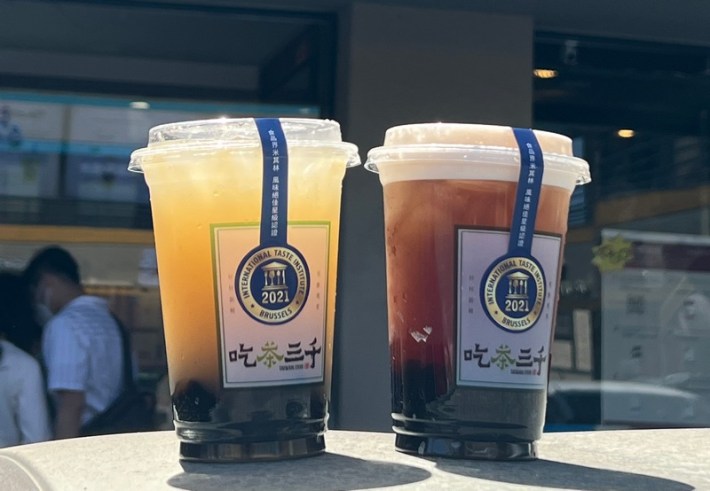
If Pot of Cha is the best all-around, Fluffy Head is the spot for cheese-tea-topping, and Xing Fu Tang boasts the best tapioca balls in town, Chicha San Chen is the place to go for the highest-quality tea used in boba drinks.
Born in 1998 in Taichung, Taiwan’s second largest city, located in the center of the island, this chain grew to have a couple hundred locations in Taiwan alone in its first 15 years. With locations throughout Asia, as well as Canada and its single USA location in San Gabriel, Chicha San Chen’s distinguishing feature is its exclusive, patented teapresso machine—Lion AI—which the company claims offers 1000 different setting adjustments to create 100 drink combinations. This is what they say allows them to get the best flavors out of all six of the main categories of tea.
At their main concept store in Taichung, you can do traditional oolong tea tastings and check out their temperature-controlled roof garden where they actually transferred and replanted plants from Li Shan; an area well-known for Taiwanese high mountain oolong teas. Their San Gabriel outpost does not have these sort of experiential elements—although it does have a branded oolong travel kit on display near the register, which you can also buy—but the consistent quality in their drinks has earned them one of the most loyal followings (and longest wait times) for boba in the L.A. area.
Fortunately, you can order online in advance—in fact, even if you go to the store you have to order this way, as COVID caused the full closure of their indoor dining space—and even though I counted 10 employees working to make drinks on a recent visit, you still can expect to wait at least 30 minutes for your drink during busy weekend afternoons.
Still, whether you order the black tea, high mountain oolong tea, or dong ding—many sourced from areas near Taichung and specified down to the county of production—with whatever parameters you prefer, the quality of the tea will stand out. They even have a little prize sticker from the 2021 International Taste Institute in Brussels on every cup to prove it (although if you check online, like I did, there are about 13 pages of teas, many from Taiwan, that made the cut). None of this matters much by the time you have tea in hand and take that first sip.
Recommendations:
- Dong ding oolong, light sugar, less ice, bubble
- Bubble milk tea (which is called King Pearl Milk Tea in Chinese and deservedly so)
301 W Valley Blvd #116, San Gabriel, CA 91776. Closest Metro lines and stop: Bus Lines 76 or 487 - “Valley/Abbot.”
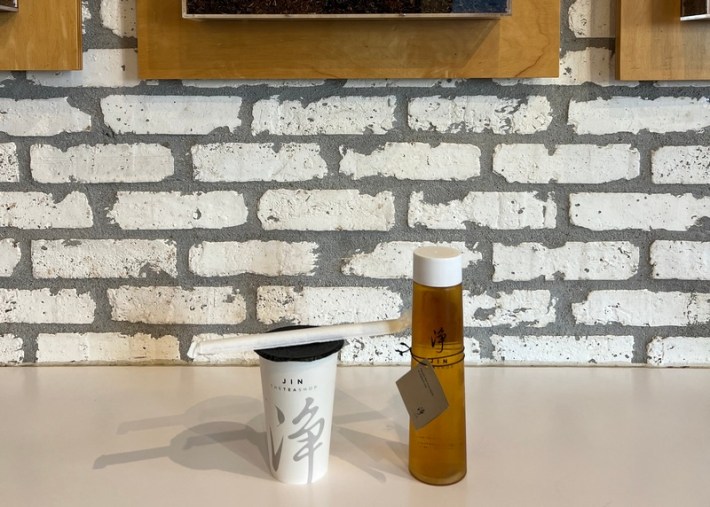
The first Boiling Point opened in Hacienda Heights in 2004. It grew quickly, offering a great entry point into the world of traditional hot pot stews for many in Los Angeles. It caught on and soon, it brought its trademark Taiwanese-style smaller hot pot soups to other states, Canada, and China. They’d set out to modernize a traditional concept and sell it at scale. Whether they lost anything in the process, is a topic for another list.
The Boiling Pot Group decided to tackle the other famous cauldron of boiling water from East Asia when they opened Jin Tea next to their Boiling Point Concept store in Pasadena. Like many of the better boba shops around town, Jin specializes in Taiwanese teas—namely oolongs—taking extra steps to ensure all of their products are certified CERES, a German organic certification (something few other boba places do). Like Chicha San Chen, Jin sources their own teas in Taiwan for their drinks and also offers them for sale at the store, along with several tea tumblers.
As much as a video on their website might hammer home the peace and serenity of their products—albeit in a bit of an over-the-top fashion with a guy in a collared shirt bending over and taking a drink from a stream in a forest—their products in their shop window send a different message. Jin promotes their Instagram-able specialty drinks that come pre-made in plastic tubes with bright colors and names like Butterfly Pea Flower Lemonade, Love Potion and Sunny Honey. The Day & Night Milk Tea is made with activated charcoal.
Have they successfully blended tradition with the modern here, the same balance they sought to strike with Boiling Point itself? I’m not sure.
All I know is that they do a pretty good job with Oriental Beauty Oolong Tea specifically—both as an unsweetened cold brew and as a milk tea with boba—and that drink alone is worth a go if you’re hanging in Pasadena looking for boba. In fact, I’d go as far as to say Jin’s cold brew options are among the best in the city writ large, even if they are limited in range (they sell three types, all Taiwanese oolong).
If you dig having cold brew on deck, especially in these hot months, let me also remind you that you can easily buy higher quality teas from the other vendors on this list, add around 5-10 grams per liter of water into a glass tumbler and put it in the fridge overnight. The end result will easily surpass Jin and you won’t have to drink it out of a plastic container. On the other hand, Jin does offer part-tea jugs of their oolong teas in 96 oz boxes too, which is a lot harder to make at home.
Recommendations:
- Oriental Beauty Oolong (cold brew or milk tea w/ boba)
18 W Green St #2008, Pasadena, CA 91105. Closest Metro line and stop: Metro A Line - "Del Mar Station" Bus Lines 180, 256, 260, 267, 660 or 686 - “Colorado/Fair Oaks.”
IG: @jinteashop
Part IV: Kombucha Tea
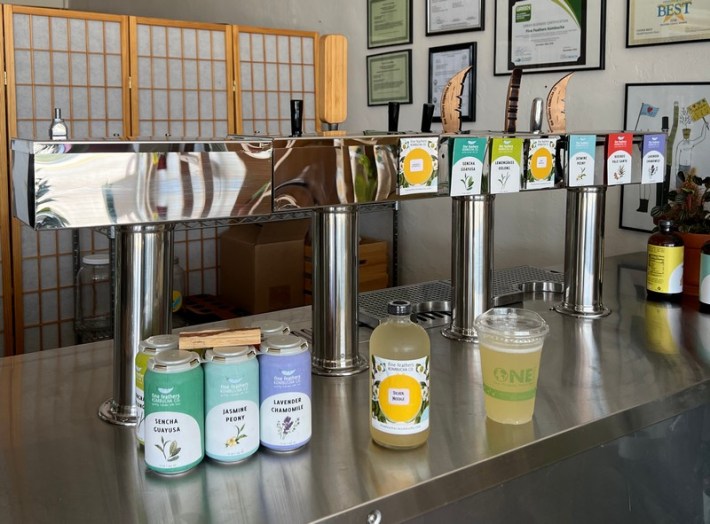
Los Angeles and the fermented tea probiotic beverage kombucha are well-acquainted.
Both GT’s Living Foods (Beverly Hills) and Health-Ade (Torrance) have their headquarters here. You can now buy and drink hard kombuchas everywhere from Banc of California Stadium to the Hollywood Bowl. Ojai’s Flying Embers has a tap house in DTLA in the ruins of the old Iron Triangle Brewery. There is a tasting room for San Diego-based June Shine on Main Street in Santa Monica. Sage Plant Based Bistro offers its in-house brewed hard and soft kombuchas at locations in Echo Park, Culver City and Pasadena. Better Booch and kombucha Dog are both brewed in Los Angeles.
Still, among all these many options, it is a small-batch brewery in Long Beach that deserves the distinction as the best kombucha in town.
Why? As usual, it starts with the tea. Since 2012, Fine Feathers has been a staple of the Southern California craft kombucha scene. On a recent visit to the tasting room, on an unassuming corner of Long Beach Boulevard where the Blue Line slides by every few minutes, Terrance offered samples straight out of the tap of batches he’d personally sampled earlier for quality control. Connecting the hose to a silo of their specialty silver needle kombucha—made with delicate silver needle white tea—Terrance proceeded to blow my mind.
This kombucha injected the essence of an exquisitely well-brewed white tea into a burst of lightly bubbly soothing refreshment cool enough to chill out the most brutal of Southern California summer days. Fine Feathers offers a solid regular flavor roster—from lemongrass oolong to sencha guyasa to jasmine peony—as well as seasonal and rotating flavors (Terrance told me he was dreaming up a dragon needle which would combine dragon fruit and white needle).
Fine Feathers offer cups off the tap to go, growlers, glass bottles, or cans, and might be producing alcoholic versions of their excellent kombuchas in the near future. Best of all, Fine Feathers offers all the fixings to make your own kombucha including SCOOBYS, full-blown starter kits, and brewing workshops—making it a kind of community hub for seasoned and newbie brewers alike.
They also offer some of the loose-leaf teas they use in their kombucha for sale on site, as much an indicator as any that these are brewers who care about what ingredients go into their batches. It’s no wonder then that Fine Feather’s kombuchas provide a balanced, tea-forward probiotic without any of the brutal sour-sock stank that runs afoul of so many big kombucha brands. If you’ve never liked kombucha because of this olfactory violence before, this is the shop that will change your mind.
Recommendations:
- White needle on tap (or in a bottle or growler)
- Sencha Guayusa, Lemongrass Oolong, Jasmine Peony
2296 Long Beach Blvd. Long Beach, CA 90806. Closest Metro line and stop: Metro A Line - "Willow Street Station."
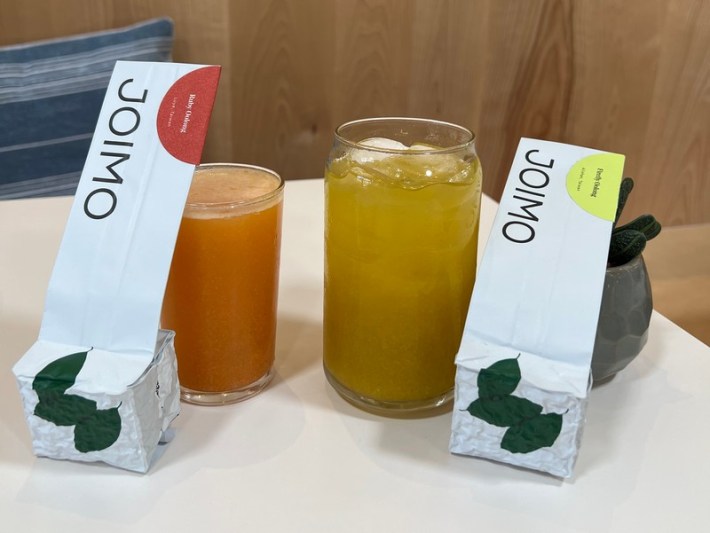
Popping up on seemingly every “Best of Los Angeles” restaurant list since its opening in 2019, there are enough reasons to visit Yang’s Kitchen in Alhambra for what’s on the plate alone. Yet you’ve not fully enjoyed the famed cornmeal mochi pancake until you’ve washed it down with the specialty oolong fresca, nor have you experienced the ethereal crunch of the homemade hash brown brick until you’ve paired it with a seasonal kombucha.
Since exploring the food menu at Yang’s Kitchen is a journey into the best farmers market stalls in and around Los Angeles, maybe it should come as no surprise that the same holds true for the tea menu. In fact, since owner Chris Yang actually launched a tea brand—Joimo—along with two tea-loving friends not long after opening Yang’s, it made sense that teas would feature prominently on the menu.
Specializing in oolong teas from Taiwan, Joimo’s oolongs (Firefly, Ruby, and High Mountain) are available to order with a meal at Yang’s Kitchen and are a treat on their own, but they really shine in their fresca and kombucha forms. The oolong fresca takes the Joimo loose leaf oolong and combines it with Valencia oranges, lemongrass, lime leaf, and mint. The result is a drink that offers the freshness of the best fruit juices with the grounded buzz of a solid oolong. It might be the best non-alcoholic beverage to have at a daytime meal in Los Angeles.
Then, there’s the kombucha. Joimo’s origin story comes from Chris’s adventures into homebrewing it. His enthusiasm for experimenting with seasonal fruits is unrelenting. At Yang’s, customers have enjoyed nectarine, mango-guava, apricot, and pineapple tepache kombucha, with all the ingredients sourced from the same top-notch farms where Yang’s arms their kitchen.
To drink kombucha at Yang’s is to enjoy the bounty of the farmers in Southern California and their counterparts in the mountains of Taiwan at the same time. Like so many other items at Yang’s, it pays respect to the farmer’s labor first and foremost, in turn, offering L.A. diners a chance to honor them as well.
Just as kombucha is nothing without tea, the teas we love in Los Angeles and the world over, are nothing without the farmers and producers who’ve often learned the trade through multiple generations. Word on the street is that Yang is looking at spaces in DTLA to increase kombucha production and would include a small tasting window. As long as they continue to source and use quality teas and ingredients, the mind reels at the batches and flavors still to come.
Recommendations:
- Oolong fresca
- Seasonal kombucha
- Loose-leaf Joimo teas are available in store or online
112 W. Main St., Alhambra, CA 91801. Closest Metro line and stop: Bus Line 78 - “Main/2nd.”
IG: @yangskitchenla IG: @joimotea
Part V: Outside
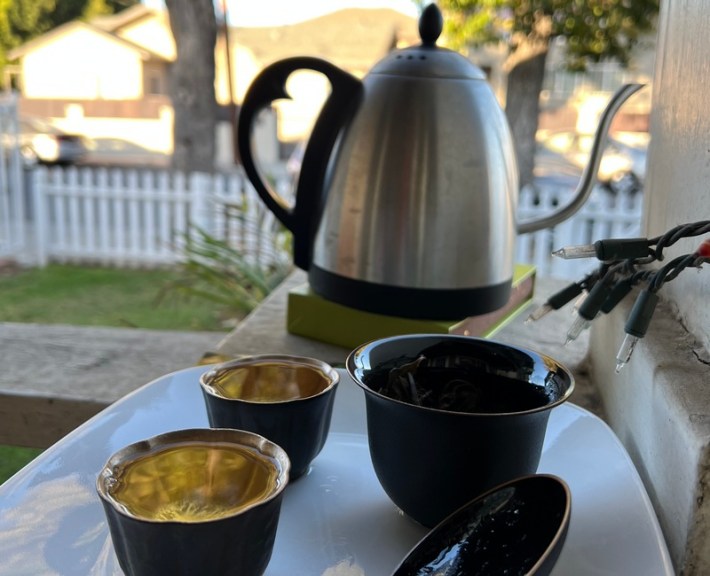
DIY Tea Outdoors
In 2015, a group of anonymous artists and woodworkers put up a tea house in Griffith Park overnight without permission. Using redwood from the 2007 Griffith Park fire, the tea house was a place visitors could interact with on their own terms. It held impromptu tea ceremonies and guests could write their hopes for the city on little wood blocks.
Eventually the park service forced the tea house to move. It went to San Pedro next, but that, too, was short lived. Soon it vanished for good. I had spent much of 2015 running the trails of Griffith Park, completely oblivious to the tea house until it was already gone. Now only a small bench and the frame is left on a small trail due north of the Mount Hollywood overlook, like a chalk outline of what held so much promise for Los Angeles tea.
It’s a shame, too, because if it still existed, it would have been at the top of this list. Like all beverages that draw obsessives and poets, tea—whether gongfu style, mugged, cold-brewed, with boba, or fermented in a kombucha—is a drink that links us to the natural world. The climate, the soil, the elevation, the weather, the age of the tea tree, the cultivar; all of these things have an effect on what we eventually put in our bodies.
The natural world is always nearby in Los Angeles. From Angeles National Forest to the trails winding through the Verdugos to the beaches that hug the coastline and all the backyards, rooftops and front porches in between, it’s a city meant to be enjoyed outside.
The same goes for tea. As the second-most consumed beverage after water, for so many in the world, tea is like air—you only grow to appreciate it when it’s at its freshest.
What better place to wonder about all the things tea is—or is not—and all the things we are or are not, than outside?
Where better to take it way too seriously or to laugh it all off entirely than sipping the glowing liquid of your choice while bathed in L.A. sunlight?
Recommendations for where to drink tea outside:
- Ruins of the Griffith Park Tea House
- Mt. Disappointment Hike
- Kenneth Hahn State Recreational Area
- Exposition Park
- Point Vicente Lighthouse
- Any front porch or backyard of your choosing
